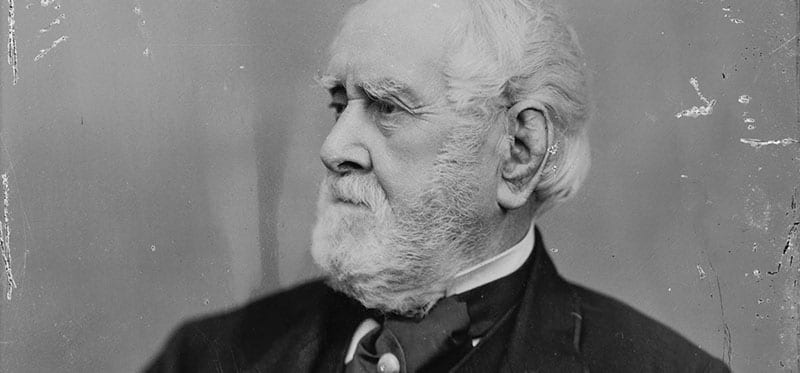By Steven Seggi, B.S. ‘24, Political Science
Tejal Mathew, B.A. ‘27, Political Science
The Albert H. Small Center for National Capital Studies coordinates D.C. Mondays, a virtual lecture series that invites authors, researchers and community members to give talks on Washington’s local history, politics and culture. On January 29, 2024, the program featured Mark L. Goldstein, who discussed his new book, Before the Gilded Age: W.W. Corcoran and the Rise of American Capital and Culture (Georgetown University Press, 2023).
Goldstein shared the understudied influence of one of D.C.’s most powerful figures, William Wilson Corcoran, and his contributions to the landscape, culture and history of Washington D.C.. Goldstein, who previously held senior positions in the U.S. Senate Committee on Governmental Affairs and the U.S. Government Accountability Office, offered a glimpse into Corcoran’s critical position in the banking industry and his behind-the-scenes role in national politics.

Corcoran was born in Georgetown in 1798, the son of Thomas Corcoran, an Irish immigrant and wealthy dry-goods entrepreneur. Young Corcoran diverged from the family business, developing an affinity for banking and real-estate investment.
After the Panic of 1819 provoked widespread economic failure, Corcoran founded the Corcoran Bank alongside silent investor Elijah Riggs. Their cooperative effort produced an institution that lasted for nearly 200 years until PNC purchased it in 2005. It was the trusted bank of many congressmen and was used to finance the presidential salary. During the Mexican-American War, W. W. Corcoran facilitated bond investment and cornered debt, becoming one of the industry’s most trusted advisors and an unofficial government spokesman on Wall Street.
The bank also served the common man, including free African Americans. Holding accounts for free Black customers was uncommon for White-owned banks at the time, and Corcoran’s personal position as an enslaver complicated his bank’s policy. Eventually he supported emancipation, freeing the enslaved people he owned and buying the freedom of others before the Civil War began.
Corcoran had friends on both sides of the Civil War because he built relationships with political figures of all affiliations. Contemporaries were suspicious of his loyalties, and scholars now recognize Corcoran as a Confederate sympathizer. In 1862 he converted his money to gold and fled to Europe, returning after the war ended in 1865. Once home, Corcoran repaired pre-war relationships, brought Northern and Southern politicians together, and supported Southern states’ recovery efforts.
In D.C., Corcoran’s legacy includes championing the creation of the National Mall and several other acts of art patronage. He served on the George Washington University’s Board of Trustees and was also an early investor in the telegraph, major railroads and land development in the West.
In Before the Gilded Age, Goldstein sheds light on one of Washington’s lesser-known historical figures, who had a profound impact on the city. You can watch a video of this D.C. Monday program below, and browse upcoming talks.
This post was written by students in Professor Jessica McCaughey’s COMM 3190 class at the George Washington University.
About the Authors
Steven Seggi an undergraduate studying political science at the George Washington University. He focuses primarily on the politics of the Middle East and is especially interested in how the region’s history informs current events.
Tejal Mathew is an undergraduate studying political science at the George Washington University.
Header image: W. W. Corcoran, c. 1865-1880. Brady-Handy Photograph Collection, Library of Congress, Prints and Photographs Division.
